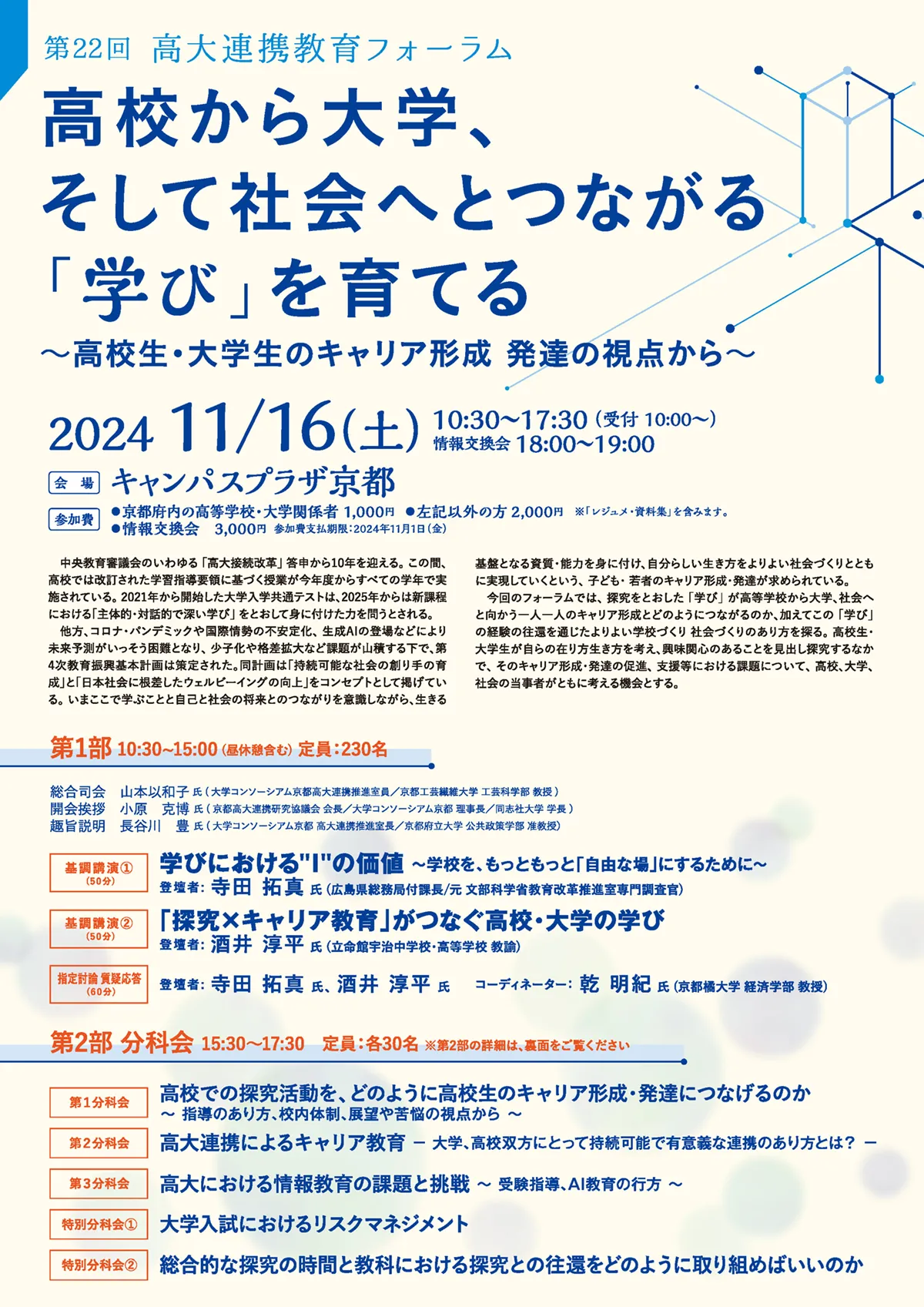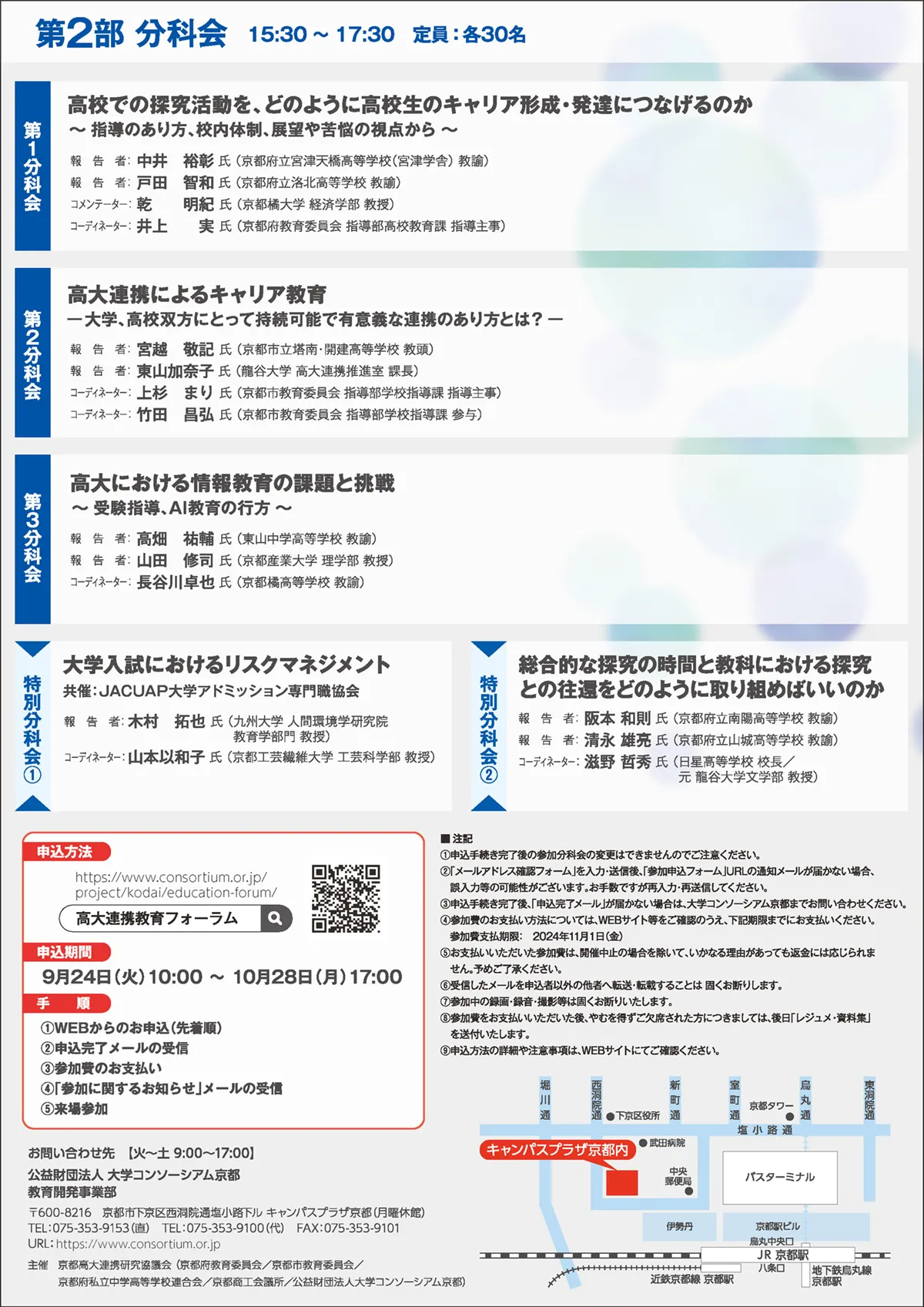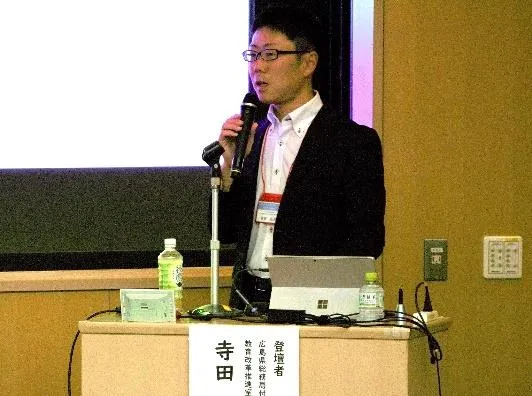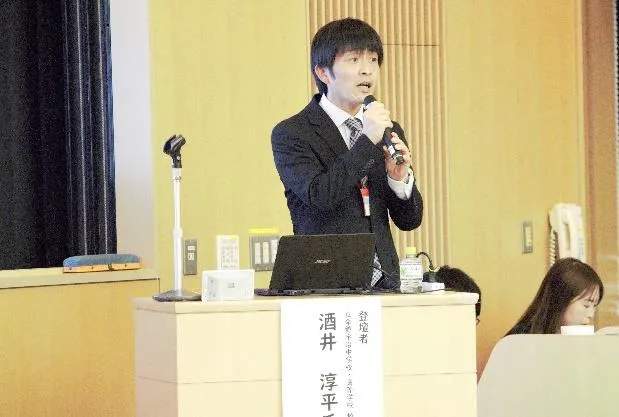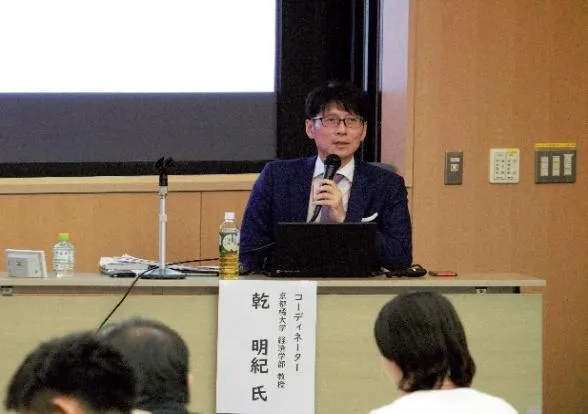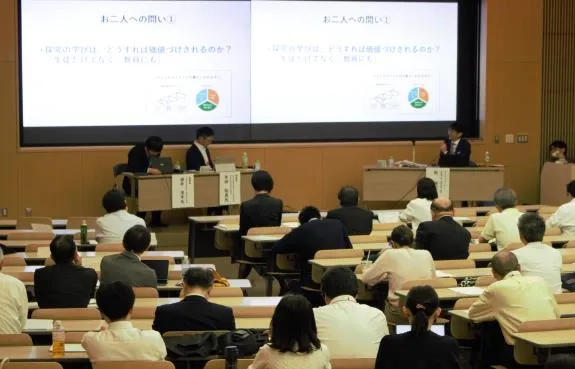Business overview
The forum aims to “share information on domestic trends and disseminate information on initiatives in Kyoto” regarding issues of collaboration and connected education between high schools and universities.
Event Overview
The 22nd High School-University Collaborative Education Forum
It’s been 10 years since the Central Council for Education’s report on the so-called “high school-university transition reform.” Since this academic year, high schools have been implementing classes based on the revised curriculum guidelines. The Common University Entrance Examination, which began in 2021, is expected to assess the skills acquired through “proactive, interactive, and in-depth learning” under the new curriculum from 2025.
Meanwhile, the COVID-19 pandemic, the destabilizing international situation, and the emergence of generative AI have made predicting the future even more difficult. The Fourth Basic Plan for the Promotion of Education was formulated amid mounting challenges, including a declining birthrate and widening inequality. The plan’s concepts are “nurturing creators of a sustainable society” and “improving well-being rooted in Japanese society.” The plan calls for career development and development for children and young people, who are aware of the connection between what they learn here and now and the future of themselves and society, and who acquire the fundamental qualities and abilities necessary to live their lives and realize a better society.
This forum will explore how “learning” through inquiry connects to each individual’s career development as they move from high school to university and into society, and how to create a better school and society through the exchange of this “learning” experience. As high school and university students consider their own way of life and discover and explore their interests, it will be an opportunity for high school, university, and society to come together and think about issues related to promoting and supporting their career development and development.
| schedule | Saturday, November 16, 2024 (10:30-17:30) | |||
| venue | Campus Plaza Kyoto | |||
| theme | Fostering “learning” that connects high school to university and society – From the perspective of career development and career formation for high school and university students |
|||
| Capacity (first come, first served) |
Part 1 | Keynote speech 1, keynote speech 2, designated discussion | 230 people | |
| Part 2 | Subcommittee 1, 2, 3 | 30 people each | ||
| Special subcommittee 1, 2 | ||||
| Information exchange meeting | 60 people | |||
| Participation fee | Part 1 and Part 2 |
High school and university officials in Kyoto Prefecture | 1,000 yen | |
| Anyone other than those mentioned above | 2,000 yen | |||
| *Includes “resumes and collection of materials.” | ||||
| Information exchange meeting |
If you wish to participate in the information exchange session to be held at Campus Plaza Kyoto Hall, please pay the amount shown on the right in advance. | 3,000 yen | ||
| Organizer | Kyoto High School-University Collaborative Research Council (Kyoto Prefectural Board of Education / Kyoto City Board of Education / Kyoto Prefectural Private Junior and Senior High School Association / Kyoto Chamber of Commerce and Industry / University Consortium Kyoto, a public interest incorporated foundation) | |||
The flyer for the 22nd High School-University Collaboration Education Forum can be downloaded here.
[Part 1] 10:30-15:00 Keynote speech 1, keynote speech 2, designated discussion
Chairperson:
Ms. Iwako Yamamoto (Professor, Faculty of Engineering and Science, Kyoto Institute of Technology, Member of the University Consortium Kyoto High School Collaboration Promotion Office)
Opening remarks:
Mr. Katsuhiro Obara (Chairman, Kyoto High School and University Collaboration Research Council, Chairman of the University Consortium Kyoto, President of Doshisha University)
Purpose explanation:
Mr. Yutaka Hasegawa (Director, University Consortium Kyoto High School and University Collaboration Promotion Office, Associate Professor, Faculty of Public Policy, Kyoto Prefectural University)
| Keynote Speech 1 10:45-11:35 |
The value of “I” in learning: Making school a more “free place”
|
|
|
“Motivation” and “Transfer.” These are the two biggest challenges currently facing primary and secondary education in Japan (and the world) (and perhaps higher education as well). Could inquiry and career education be the “trump card” to solve this? Furthermore, we are currently in what could be called the “meteor shower era of education reform,” with educational reform measures being introduced in rapid succession to schools. Why is it that top-down “educational reform” cannot truly “reform” schools? I would like to consider these two points. |
||
| 11:35-11:45 | break | |
| Keynote speech 2 11:45-12:35 |
Learning at high school and university that connects “exploration x career education”
|
|
|
The curriculum guidelines for high schools that will be implemented from 2022 place emphasis on “inquiry,” and each school is making progress in implementing comprehensive inquiry time. Meanwhile, it goes without saying that career education is important when considering high school-university connections and high school education. We will consider how students’ learning connects with high school and university through comprehensive inquiry time, incorporating a career education perspective, from the perspective of student learning. At the same time, we would like to consider the next phase of high school-university collaboration together with the participants. |
||
| 12:35-14:00 | Lunch break | |
| 14:00-15:00 | Designated discussions and Q&A sessions | |
|
||
[Part 2] 15:30-17:30 Breakout session
| 1st subcommittee | How can we connect high school inquiry activities to students’ career development and development ? From the perspective of instruction, school structure, prospects, and struggles.
Speakers:
Hiroaki Nakai (Teacher, Miyazu Amabashi High School, Kyoto Prefecture) and Tomokazu Toda (Teacher, Rakuhoku High School, Kyoto Prefecture). Commentators: Akinori Inui (Professor, Faculty of Economics, Kyoto Tachibana University). Coordinator: Minoru Inoue (Director, High School Education Division, Guidance Department, Kyoto Prefectural Board of Education). |
|
|
At Miyazu Amabashi High School, students focus on the “community” where they were born and raised and engage in research activities that allow them to examine their own existence. This will report on case studies that have emerged from these activities, highlighting the relationship between students’ careers and the “community.” Rakuhoku High School will consider the impact of research activities on career development based on survey results and the future career paths of graduates. It will report on the prospects and challenges of applying the results of research activities in the integrated junior and senior high school science department to the general education department. Participants from both high school and university will consider research activities from the perspective of career formation and development. |
||
| 2nd subcommittee | Career education through high school -university collaboration: What is the most sustainable and meaningful collaboration for both universities and high schools?
Presenters:
Takanori Miyakoshi (Vice Principal, Tonan Kaiken High School, Kyoto Municipal) ; Kanako Higashiyama (Section Chief, High School-University Collaboration Promotion Office, Ryukoku University) ; Coordinators: Mari Uesugi (Director, School Guidance Division, Guidance Department, Kyoto City Board of Education); Masahiro Takeda (Counselor, School Guidance Division, Guidance Department, Kyoto City Board of Education) |
|
| Ryukoku University and Kaiken High School have signed an agreement on high school-university collaboration, and Ryukoku University is planning and running inquiry-based programs for Kaiken High School students, as well as providing learning support in inquiry-based classes. We will share the status of these efforts and discuss how to create a sustainable and meaningful collaboration for both the university and the high school. | ||
| 3rd subcommittee | Issues and challenges in information education in high schools and universities : exam preparation guidance and the future of AI education
Presenters:
Yusuke Takahata (Teacher, Higashiyama Junior and Senior High School) , Shuji Yamada (Professor, Faculty of Science, Kyoto Sangyo University), Coordinator: Takuya Hasegawa (Teacher, Kyoto Tachibana High School) |
|
| With the information society becoming more informatized, efforts are being made to enhance information education, and information subjects have been added to the common university entrance examination. Universities are also expanding their mathematics, data science, and AI education programs. This subcommittee will deepen discussions on the challenges and initiatives of information education at high schools and universities, based on reports from Higashiyama High School, which aims to balance exam preparation guidance with career education, and Kyoto Sangyo University, which promotes mathematics, data science, and AI education with an eye toward liberal arts faculties. | ||
| Special subcommittee ① | Risk Management in University Admissions Co-hosted by: JACUAP Association of College Admissions Professionals
Presenter:
Takuya Kimura (Professor, Department of Education, Graduate School of Human-Environment Studies, Kyushu University) Coordinator: Iwako Yamamoto (Professor, Faculty of Science and Technology, Kyoto Institute of Technology) |
|
|
Educational directions and methods are changing in response to technological innovation and social change. Naturally, entrance exams and related operations are also changing in step with these changes, with universities responding to trends that anticipate practice and development. In order to develop sound implementation and plans for new entrance exams, we aim to inventory the risks associated with increasingly complex and expanding entrance exams and acquire the relevant knowledge. *This subcommittee is only open to university faculty and staff. |
||
| Special subcommittee ② | How should we go back and forth between comprehensive inquiry time and subject-specific inquiry?
Presenters:
Kazunori Sakamoto (Teacher, Nanyo High School, Kyoto Prefecture) and Yusuke Kiyonaga (Teacher, Yamashiro High School, Kyoto Prefecture). Coordinator: Tetsuhide Shigeno (Principal, Nissei High School/Former Professor, Faculty of Letters, Ryukoku University). |
|
| Ideally, “integrated inquiry time” and “subject-based lessons” should have a mutually reciprocating relationship. While we have begun implementing integrated inquiry time, are we able to change the subject-based style of “students copying notes from the board” and “ICT is used, but the teacher is the main source of explanation”? Based on case studies of lessons that utilize knowledge such as “QFT (Question Formulation)” and “Dialogic Argumentation,” we will discuss lessons and inquiry that create “proactive, dialogic, collaborative, and deep learning.” | ||
Information exchange meeting
| 18:00-19:00 |
We will be holding an information exchange session in the Campus Plaza Kyoto 2nd floor hall, where the forum will be held. Light snacks and drinks will be provided, so we hope you will join us. |
|
Implementation Report
▶ Report from the 22nd High School-University Collaborative Education Forum [Click here for details]
This year’s theme was “Fostering ‘Learning’ that Connects High School to University and Society: From the Perspective of Career Development and Achievement for High School and University Students,” and 73 people from across Japan participated.
The first keynote speech was delivered by Takuma Terada, Section Chief of the Hiroshima Prefectural General Affairs Bureau and former Specialist Researcher for the Ministry of Education, Culture, Sports, Science and Technology’s Educational Reform Promotion Office, who spoke on the theme of “The Value of ‘I’ in Learning: Toward Making Schools Even More Free Spaces.” Junpei Sakai, a professor at Ritsumeikan Uji Junior and Senior High School, spoke on the theme of “Connecting High School and University Learning through ‘Inquiry and Career Education.'”
Professor Akinori Inui, professor at Kyoto Tachibana University’s Faculty of Economics, served as moderator for the designated discussion and Q&A session. He organized the keynote speeches and posed his insights and questions to the speakers, clearly articulating the issues and key points of discussion for participants. He also answered questions from the floor, deepening the discussion on how “learning through inquiry connects to each individual’s career development as they move from high school to university and into society.”
In the second part, each high school introduced case studies in line with the theme of the forum, and a breakout session was held on the theme of “university entrance exams.” Participants shared case studies and challenges, leading to a lively exchange of opinions.
Contact Information
Kyoto High School-University Collaboration Research Council
(High School-University Collaboration Division, Educational Development Department, University Consortium Kyoto, Public Interest Incorporated Foundation)
TEL: 075-353-9153 FAX: 075-353-9101
Campus Plaza Kyoto, Nishinotoin-dori Shiokoji-sagaru, Shimogyo-ku, Kyoto 600-8216
*Reception hours: Tuesday to Saturday, 9:00-17:00 (excluding New Year’s holidays)














